The Minister of Public Safety in Canada, Vic Toews, recently made comments about Omar Khadr's potential transfer to Canada from Guantánamo Bay, where he has been incarcerated since 2002 when he was just 15 years old. The comment by Toews comes after the US formally requested a transfer in April of 2012, and after months of silence and inaction. Omar Khadr pleaded guilty in Guantánamo in 2010 to five charges. Under a plea deal, Khadr had his sentence reduced from 40 to 8 years. Such a transfer would allow Omar Khadr to serve the remainder of his sentence in Canada.
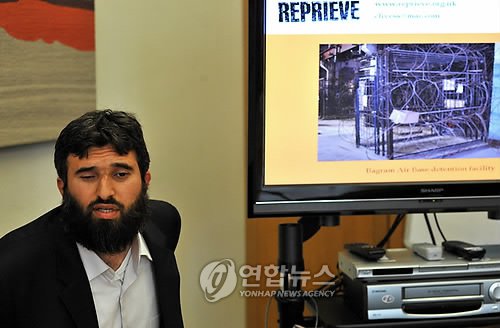 Authored by Alexa O'Brien and Heather Marsh.
Authored by Alexa O'Brien and Heather Marsh.
Omar Deghayes is a UK citizen who was imprisoned in Guantánamo in January 2002 and freed from there on December 18, 2007. Details of his treatment in Guantánamo can be read here. He speaks to PressTV about his experiences here.
Omar Khadr is a Canadian citizen who was captured at fifteen after the compound he was living in in Afghanistan was bombed by US military. He was tortured at Bagram prison and Guantánamo, and has spent the last nine years of his life imprisoned by the US. WL Central coverage on Omar Khadr is here.
Omar Deghayes spoke to WL Central's Alexa O'Brien on June 5. The following is an excerpt from that interview.
Did you have any contact with Omar Khadr?
OD: Yes definitely. I know him very well. He was locked up in Camp 5 for a long time, and I saw him in the other camp also before for a short period of time. But in Camp 5 I was locked up with him for a long time.
Do you think that Omar Khadr would be a threat to society if and when he is released to Canada?
OD: No. Definitely not. Even the guard and the interrogators in Guantanamo I think used to like him a lot ... for his personality. He is an open, kind person. I don't think he would be a threat to society. No.
"The only crime in my view, equal to willful inhumanity is the crime of indifference, silence and forgetting."
Dennis Edney, Lawyer For Omar Khadr speaks on Fear, Injustice and his Guantanamo visits in a Conference on Islamophobia and The Politics of Fear at Islamic Society of York Region, Toronto Canada, May 21, 2011. This is the conference that Moazzam Begg was denied permission to board a direct Air Canada flight from London to Toronto to speak at "because of US policy" and the extremely unlikely possibility that the flight may be diverted into US air space.
The following are transcribed excerpts from Dennis Edney's speech.
What we are witnessing is the constant drip of sanity slipping from our grasp as our apathy has allowed whispers of anti-Muslim sentiment to become part of the mainstream on conversation.
On Guantanamo protecting us: We want to protect ourselves from the voice of people like Moazzam Begg.
Updated information from Khadr's legal counsel states that the Supreme Court dismissal this morning related to a years old appeal from Khadr that was actually disallowed last fall by the terms of his plea deal, which ordered "he must dismiss all presently pending action."
“As part of his pre-trial agreement, he had to dismiss his claim against the government,” said his US military defense attorney Lt.-Col. Jackson. “Once the claim was dismissed, and the government accepted the dismissal, they still keep the caption (or heading) of the case as Khadr vs. Obama (as a way to keep the process) consistent, but he’s no longer a plaintiff on that.” Khadr's request for review was bundled with several other requests from other Guantanamo prisoners.
The request for clemency still stands and may be heard this week.
The US Supreme Court denied Guantanamo inmate Omar Khadr's request for clemency today. While a majority voted against granting the petition, Justices Stephen Breyer and Sonia Sotomayor "indicated that they wanted to review the case." Courthouse News opines "Monday's contribution affirms the appearance that the court will defer to the mostly conservative D.C. Circuit on Guantanamo detention matters. The justices have not decided a detainee case in nearly three years."
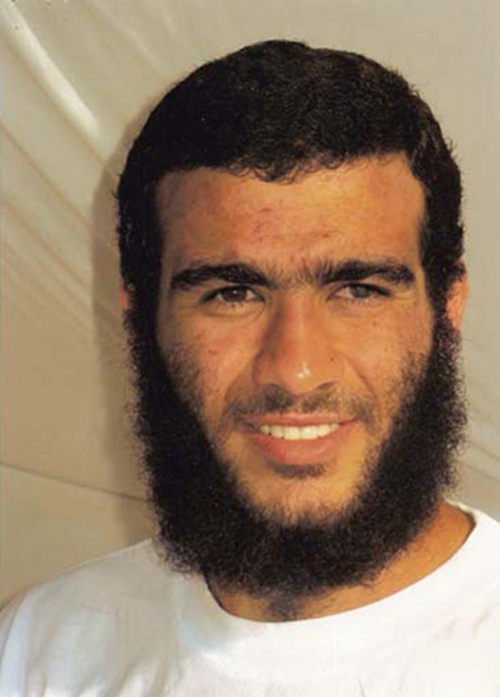 Dennis you always say that I have an obligation to show the world what is going on down here and it seems that we've done every thing but the world doesn't get it, so it might work if the world sees the US sentencing a child to life in prison, it might show the world how unfair and sham this process is, and if the world doesn't see all this, to what world am I being released to? A world of hate, unjust and discrimination! I really don't want to live in a life like this. - Omar Khadr in a letter to defense attorney Dennis Edney.
Dennis you always say that I have an obligation to show the world what is going on down here and it seems that we've done every thing but the world doesn't get it, so it might work if the world sees the US sentencing a child to life in prison, it might show the world how unfair and sham this process is, and if the world doesn't see all this, to what world am I being released to? A world of hate, unjust and discrimination! I really don't want to live in a life like this. - Omar Khadr in a letter to defense attorney Dennis Edney.
Omar Khadr was the first child soldier to be charged with a war crime since world war two. The non-existent crime that he was charged with, “murder in violation of the law of war” can be summed up as: It is legal for US soldiers to kill children. It is a war crime for children to kill US soldiers.
After eight years of delays while the US government searched for a possible crime and changed courts and judge, Omar found himself in front of a military tribunal with seven military officers who decided his fate ought to be another forty years of imprisonment. (For a sentence of ten years or more, six of the seven jurors had to agree.) Human Rights Watch said of the fifteen officers selected as potential jurors, All of the 15 indicated that Khadr's age held no significance for the case. ... An Air Force Captain said that in his opinion, a child would need to be as young as five or six to avoid adult courts if accused of a homicide.
The plea deal
Canadian defense attorney Dennis Edney is involved in four of the cases we are currently covering. WL Central has received updates from him on three of them.
Moazzam Begg, a high profile advocate for Guantanamo inmates and international lecturer and author, was denied board on a direct Air Canada flight from London to Toronto on the grounds that the plane could possibly be diverted to the US where Begg is on a no-fly list. Begg, a British citizen, was imprisoned in Guantanamo for three years and released in 2005 with no charge. Edney had invited him to Canada to speak.
You were attempting to get him a flight over the north pole to avoid the excuse of a possible diversion into US air space - has there been any response from the Canadian authorities on that?
We have attempted to get clarification from Canadian authorities to state whether they would challenge his entry if he took a flight over Greenland so no fear of being close to U.S. airspace - with no clarification.
Who exactly have you spoken to in the Canadian government or Air Canada regarding this policy?
We have spoken to people at the Canadian High Commission and I have asked Moazzam to go to the London office to get an official response why he was not allowed to fly.
He was to attend 3 conferences in Toronto/ Montreal and Edmonton.
Abdullah Khadr, older brother of Omar, won against the Canadian government's appeal on May 6. The Canadian government was arguing in support of the US government who are trying to extradite Abdullah based on testimony obtained under torture. Edney represents both Khadrs.
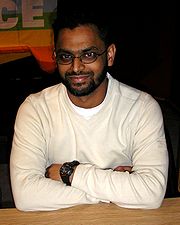 Moazzam Begg, a British citizen who was held at Guantanamo Bay for three years with no charge, was barred from boarding an Air Canada flight to Toronto today. Omar Khadr's defense attorney, Dennis Edney, had invited Begg to speak at a conference on fear and justice in Toronto on Saturday as well as other events in Quebec and Edmonton later this week.
Moazzam Begg, a British citizen who was held at Guantanamo Bay for three years with no charge, was barred from boarding an Air Canada flight to Toronto today. Omar Khadr's defense attorney, Dennis Edney, had invited Begg to speak at a conference on fear and justice in Toronto on Saturday as well as other events in Quebec and Edmonton later this week.
The Canadian Press reports that the Canadian High Commission refused permission on the basis the plane could be re-routed to the U.S. Edney contacted the high commission and was told to contact the US embassy. Edney told the Toronto Star that a Canadian foreign affairs official informed him that Begg was denied entry due to a “U.S. policy.”
Begg was released from Guantanamo Bay in 2005 and is one of the most high profile advocates for the people currently imprisoned there. He wrote a book, Enemy Combatant: A British Muslim's Journey To Guantanamo and Back (ISBN 0-7432-8567-0), is a director of Cageprisoners, and has given many interviews and lectures, written articles, and appeared as a commentator on BBC's Panorama, BBC's Newsnight, PBS's The Prisoner, Al-Jazeera's Prisoner, Taking Liberties, Torturing Democracy, and National Geographic's Guantanamo's Secrets, traveling throughout the world to do so. He has never been charged with anything. He was released by the US.
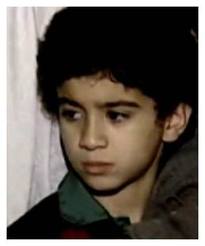 "There would be virtually no political blowback domestically for the Conservative Party if the government chooses to pursue an appeal, making this a strong likelihood.”
"There would be virtually no political blowback domestically for the Conservative Party if the government chooses to pursue an appeal, making this a strong likelihood.”
The above statement from US State cable #09OTTAWA629 sums up the last decade of Omar Khadr’s life. The Canadian government, under the last three prime ministers, two Liberal and one Conservative, have done nothing about the plight of a tortured fifteen year old Canadian boy imprisoned with no trial in the world’s most notorious torture camps. They have contributed nothing to his education, nor to his emotional or psychological welfare. They have expressed no concern for his well being. They have not requested his repatriation, nor have they requested that the illegal and amoral conditions of his confinement be improved. (Read a summary of the conditions here.) US State cable 09STATE11937 describes a February 5, 2009 meeting between French Foreign Minister Bernard Kouchner and US Secretary of State Clinton, where the French Foreign Minister requested that the US review his case, but there is no similar suggestion from the country with a legal obligation to defend him.
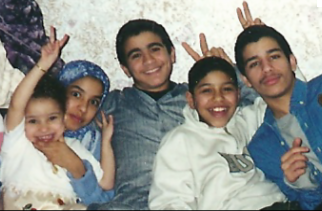 Omar Khadr (centre in the picture at left) was born in Toronto, Canada on September 19, 1986. His father was an Egyptian born Canadian who ran charities to provide food and education for orphans, and was an old friend of Osama Bin Laden. His mother was a Canadian of Palestinian descent. Omar spoke four languages fluently. When he was 15, his family sent him to accompany a group as a translator. The US military identified that group as Al Qaeda.
Omar Khadr (centre in the picture at left) was born in Toronto, Canada on September 19, 1986. His father was an Egyptian born Canadian who ran charities to provide food and education for orphans, and was an old friend of Osama Bin Laden. His mother was a Canadian of Palestinian descent. Omar spoke four languages fluently. When he was 15, his family sent him to accompany a group as a translator. The US military identified that group as Al Qaeda.
In July 2002, US Special Forces attacked the camp where he was staying. When US military entered the site, Omar was buried face down under rubble, blinded by shrapnel and crippled. Another man was beside him. US military documents say a US militant stood on top of Omar's body before realizing that someone was buried beneath. The first US fighter to arrive on the scene shot the man beside Omar dead and then shot Omar twice in the back, leaving two large exit wounds in his chest and chunks of his chest and shoulder ... blown out. He was somehow identified as being the son of his father, either before or after a second US militant prevented the first from shooting him again. He was consequently captured instead.
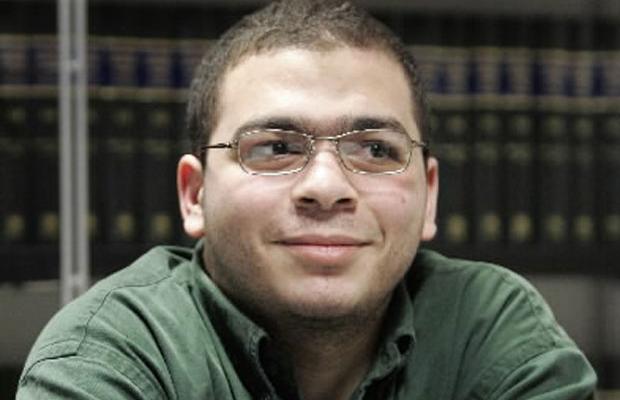 In December 2005, Abdullah Khadr, older brother of Omar, Abdurahman and Abdul Karim Khadr and younger brother of Zaynab, returned to his home in Toronto, Canada after fourteen months of being held in a Pakistan prison without charges. One week later he was arrested in Canada and held without bail, pending extradition to the US. The US had earlier obtained information from the Taliban which suggested to them Abdullah may have been the suicide bomber who killed a Canadian soldier in Kabul in January 2004. In an interview with CBC News on Feb. 25, 2004, Abdullah Khadr said, "If I was the suicide bomber, I wouldn't be doing this interview with you right now."
In December 2005, Abdullah Khadr, older brother of Omar, Abdurahman and Abdul Karim Khadr and younger brother of Zaynab, returned to his home in Toronto, Canada after fourteen months of being held in a Pakistan prison without charges. One week later he was arrested in Canada and held without bail, pending extradition to the US. The US had earlier obtained information from the Taliban which suggested to them Abdullah may have been the suicide bomber who killed a Canadian soldier in Kabul in January 2004. In an interview with CBC News on Feb. 25, 2004, Abdullah Khadr said, "If I was the suicide bomber, I wouldn't be doing this interview with you right now."
This time he was indicted in the US on charges of supplying weapons to Al Qaeda in Pakistan. In August 2006, Khadr's lawyer Dennis Edney filed an application to stay the extradition proceedings, arguing that the US government's evidence against Khadr was inadmissible because it relied on information gathered under torture in Pakistan. Khadr was held in a detention centre for the next five years until his release last August when the stay was granted and the presiding judge called his treatment "both shocking and unjustifiable."
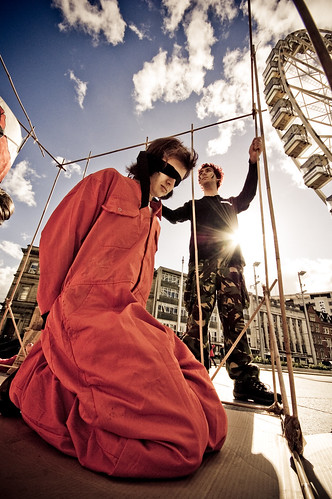
Hundreds of detainees at Guantanamo Bay are known to have engaged in hunger strikes at the prison in protest of conditions and their prolonged confinement without trial. A recent report from Jason Leopold of Truthout.org details how, as of March, detainees continue to participate in hunger strikes with the hope that the conditions of their detention will improve or so they will no longer have their basic due process rights violated.
Detainees first began to engage in hunger strikes in 2002. The hunger strikes had a definite impact. The strikes from 2002 to 2005 effectively changed the dynamics in the prison. Former detainee Binyam Mohamed said there was no law and a colonel was saying, “’I do what I like’ but after the hunger strike – the big hunger strike of 2005 – they actually started implementing some kind of law that we knew about.” But, come 2006, the prison began to force feed detainees that were striking and would force tubes down detainees’ throats in a manner that successfully convinced many of the detainees to end their resistance.
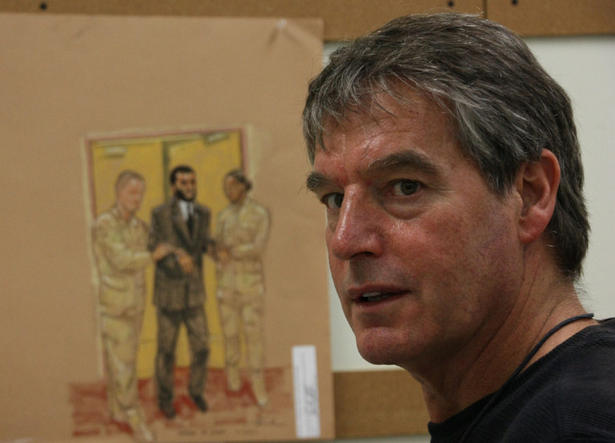
Co-authored by Alexa O'Brien
WL Central's Heather Marsh spoke this week to Dennis Edney, the Canadian defense counsel for Guantanamo inmate Omar Khadr. Following is an excerpt from the interviews.
Photo credit: Colin Perkel / The Canadian Press
Transcript:
Have you read the Wikileaks release ... the Guantanamo file on Omar Khadr?
Yes.
Do you have any observations on that?
Of course. I do. What is it that I should say about that? Well, the one thing that is striking is how unreliable the evidence is to keep people in Guantanamo Bay. So much of the evidence relied upon and detaining people in Guantanamo Bay is second-hand hearsay, unreliable, and not the kind of evidence that would stand up in any court of law, proper court of law.
What a lot of people got ... or a lot of the media got out of Omar Khadr's report is that he was being treated not so much as a criminal, but as an intelligence asset because of his family.
Which is quite ... Absolutely. And what does it suggest? What intelligence does a fifteen year old boy have? What it was is that he was being held there because of his father. So, that's what they were looking for ... information about his father ... and so, his son has been left to rot in Guantanamo Bay because the Americans want to know about the father.
The first Canadian Guantanamo file released was Omar Khadr, a much anticipated and very thin file that discussed the captured child's intelligence value as a son of a suspected Al Qaeda member and contributed nothing else of value or accuracy. (Except in this file, the 'medic' he was accused of killing in his trial is accurately described as a Special Forces soldier.)
The second widely anticipated Canadian file is that of 'Abdul Khadr', assumed to refer to Abdurahman Khadr, Omar's brother who has claimed he was in Guantanamo as a CIA plant. He was one of the ten detainees whose information was not included in the 2007 files published by the US Department of Defense under the Freedom of Information Act. Unfortunately the file does not match biographical details of any of the Khadr family (there are brothers Abdulkareem and Abdullah as well, but neither was ever in Guantanamo).
Jason Leopold, deputy managing editor of Truthout.org, tweeted "ive discovered that at least 1 of the photos in #Guantanamo files is not the detainee identified by military/govt. No idea who the person is"
So not only is all of the information about the suspects highly suspect, obtained from unreliable and tortured testimony and mistaken identities, some of the files are not even who they are labeled as.
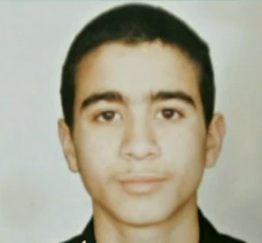 *With research assistance from Heather Marsh
*With research assistance from Heather Marsh
Pakistani national Naqib Ullah (also Naqibullah) was 14 years old and out doing an errand for his father when he was kidnapped from his village in Khan, Afghanistan by 11 men that called themselves, “Samoud’s people.” The men, according to Ullah, “forcibly raped him at gunpoint”. He was taken back to the men’s village encampment and “forced to do manual work.”
Ullah was in the camp for three days when, in December 2002, US forces raided the camp. The group had been forewarned. They ordered Ullah and others to stay behind and fight US forces. He was captured and had a weapon but it had not been fired. He was transported to Guantanamo Bay, Cuba in January 2003 because the military believed he might have knowledge of “Taliban resistance efforts and local leaders.”
This teenager is just one of twenty-two juveniles who wound up in Guantanamo. And, with the release of the Gitmo Files by WikiLeaks, more details on the capture, transfer, detention and release of juvenile detainees are becoming known.
Article 1 of the UN Convention on the Rights of the Child defines a child as “every human being below the age of eighteen years unless under the law applicable to the child, majority is attained earlier.”
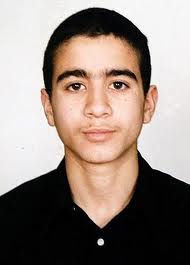 Defense attorneys for Canadian child soldier Omar Khadr, filed a motion yesterday requesting that Khadr's sentence be reduced from eight years to four. Defense claims that prosecutors had misled them into believing Khadr's plea bargain would be thrown out if they challenged the prosecution's star witness, a psychiatrist named Dr. Michael Welner. According to the motion, Army Col. Patrick Parrish, the judge presiding over Khadr’s case, joked that “Dr. Welner would have been as likely to be accurate if he used a Ouija board”.
Defense attorneys for Canadian child soldier Omar Khadr, filed a motion yesterday requesting that Khadr's sentence be reduced from eight years to four. Defense claims that prosecutors had misled them into believing Khadr's plea bargain would be thrown out if they challenged the prosecution's star witness, a psychiatrist named Dr. Michael Welner. According to the motion, Army Col. Patrick Parrish, the judge presiding over Khadr’s case, joked that “Dr. Welner would have been as likely to be accurate if he used a Ouija board”.
Dr. Welner, who was called to assess the future danger to be expected from Khadr, wrote in his response to the clemency request, “I encountered.... an area where no systematic guidelines are chronicled and no actuarial measures are available.” Khadr’s lawyers write that Dr. Michael Welner's testimony was “unscientific” and “designed solely to inflame and mislead the jury.”
Welner's testimony, based on a brief interview with Khadr, covered a great deal of territory, including statements that Khadr's family was a big influence on him (he was captured at 15 and spent the ensuing eight years in Guantanamo), and simultaneously that because he had been imprisoned without trial in maximum security torture facilities for eight years, he had been "marinated in jihad" and could not be "deradicalized". Despite the statement that he was radicalized at Guantanamo, he could not be released to Canada because of insufficient "deradicalization" programs in Canada. Welnar also stated that a devout Muslim would not fit in in Canada.
Theme by Danetsoft and Danang Probo Sayekti inspired by Maksimer